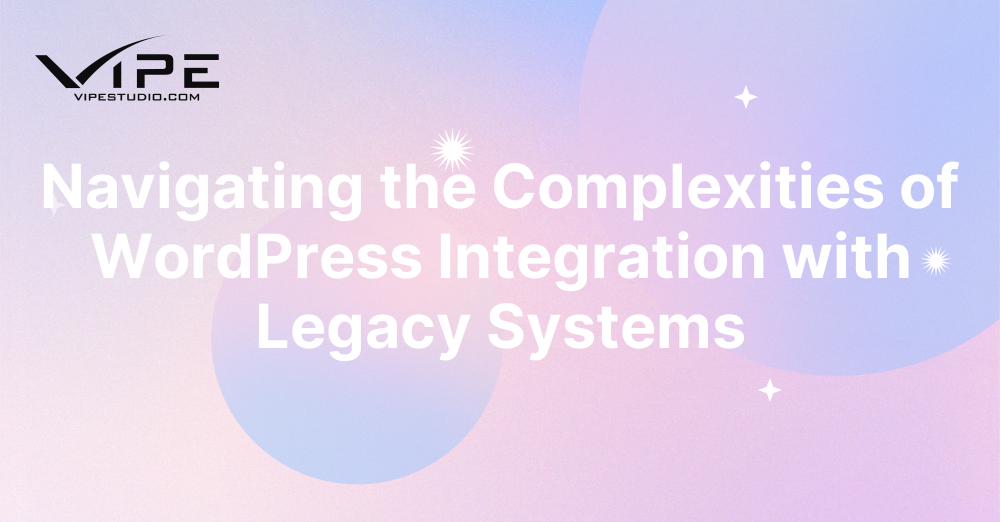22.08.2024
WordPress Development
Navigating the Complexities of WordPress Integration with Legacy Systems
READING TIME: MIN
Table of Content
Navigating the Complexities of WordPress Integration with Legacy Systems
In the digital transformation era, businesses often face the challenge of integrating modern platforms with existing legacy systems. WordPress, a versatile and robust content management system (CMS), is increasingly adopted by enterprises for its ease of use, customization, and extensive plugin ecosystem. However, integrating WordPress with legacy systems can be complex and requires careful planning and execution. Now our enterprise wordpress agency for custom development will talk about the intricacies of WordPress integration with legacy systems and provide strategies to ensure a seamless and successful integration process.
Understanding Legacy Systems
Legacy systems are often the backbone of enterprise operations, encompassing everything from enterprise resource planning (ERP) systems to customer relationship management (CRM) software and custom-built applications. These systems are typically characterized by their age, proprietary technologies, and lack of compatibility with modern web technologies. Despite their limitations, legacy systems often contain critical business data and functionalities that enterprises cannot afford to abandon. Integrating WordPress with these systems involves connecting new, flexible web interfaces with established, often rigid, backend processes and databases.
The Importance of a Clear Integration Strategy
A clear integration strategy is paramount to overcoming the challenges associated with WordPress and legacy systems integration. This strategy should include a thorough assessment of the existing IT infrastructure, identification of integration points, and a detailed plan outlining the integration steps. Enterprises must understand the data flows between WordPress and legacy systems, determine which systems will exchange data, and establish the frequency and method of data synchronization. An effective integration strategy also involves selecting the right tools and technologies to facilitate the integration, ensuring that the chosen solution aligns with the enterprise’s long-term IT strategy and goals.
Leveraging APIs for Seamless Integration
Application Programming Interfaces (APIs) play a crucial role in integrating WordPress with legacy systems. APIs enable different software systems to communicate and exchange data, providing a bridge between WordPress and legacy applications. Many modern legacy systems offer RESTful APIs or SOAP APIs that can be used to facilitate integration. WordPress’s REST API allows developers to interact with its core functionalities, making it possible to fetch, create, update, and delete content programmatically. By leveraging these APIs, enterprises can develop custom integrations that ensure real-time data synchronization and seamless interaction between WordPress and legacy systems.
Data Mapping and Transformation
Data mapping and transformation are critical components of the integration process. Legacy systems often store data in formats that are not directly compatible with modern applications. Data mapping involves defining how data fields from the legacy system correspond to data fields in WordPress. Data transformation ensures that the data is converted into the appropriate format before it is transferred between systems. Tools such as middleware platforms can facilitate data mapping and transformation, automating the process and reducing the risk of errors. Accurate data mapping and transformation are essential for maintaining data integrity and ensuring that the integrated systems function cohesively.
Ensuring Security and Compliance
Security and compliance are paramount when integrating WordPress with legacy systems. Enterprises must ensure that data transferred between systems is protected from unauthorized access and breaches. Implementing secure communication protocols, such as HTTPS and SSL/TLS, is essential for protecting data in transit. Additionally, enterprises should employ encryption for sensitive data and adhere to industry-specific regulations and standards, such as GDPR or HIPAA, to ensure compliance. Regular security audits and vulnerability assessments can help identify potential risks and address security gaps, safeguarding the integrated systems and maintaining the integrity of business operations.
Testing and Continuous Monitoring
Thorough testing and continuous monitoring are crucial to the success of any integration project. Before going live, enterprises should conduct extensive testing to ensure that the integration functions as expected. This includes functional testing to verify that data is correctly synchronized and accessible, performance testing to ensure that the integrated systems can handle the expected load, and security testing to identify and mitigate potential vulnerabilities. Once the integration is live, continuous monitoring is necessary to detect and resolve any issues promptly. Monitoring tools can provide real-time insights into system performance and data flows, enabling proactive maintenance and optimization.
Enterprise WordPress Agency For Custom Development
Scalability is another significant benefit of partnering with an enterprise WordPress agency for custom development. As your business grows, your website needs to adapt to accommodate increased traffic and additional features. Our enterprise wordpress agency for custom development services are designed with scalability in mind, ensuring that your site can evolve alongside your business. Whether you need to add new functionalities, integrate with third-party systems, or expand your e-commerce capabilities, our enterprise WordPress agency for custom development provides the flexibility you need. This scalability is crucial for maintaining a competitive edge and ensuring your website continues to meet the demands of your growing audience.
Conclusion
Integrating WordPress with legacy systems is a complex but essential endeavor for enterprises aiming to modernize their digital presence while preserving critical business functions. By developing a clear integration strategy, leveraging APIs, ensuring data mapping and transformation, prioritizing security, and conducting thorough testing and monitoring, businesses can navigate the complexities of integration effectively. Successfully integrating WordPress with legacy systems enables enterprises to harness the benefits of a modern, flexible CMS while maintaining the stability and reliability of their existing infrastructure, driving innovation and growth in the digital age.
More on The Topic
- Navigating WooCommerce Performance: Real-World Strategies
- The Role of AI in WordPress Development Workflows
- Optimizing WordPress for Enterprise: Beyond Basic Caching
- WordPress and Headless Commerce: A Provocative Dilemma
- Decoupled WordPress Architecture: The Future or a Fad?
The content of this website is copyrighted and protected by Creative Commons 4.0.



